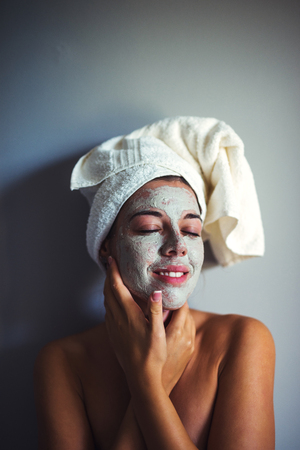Understanding the British Climate and Its Effects on Skin
For men living in the UK, skin health is closely tied to the nations famously unpredictable weather. The constant drizzle, persistent dampness, and blustery winds are more than just conversation starters—they present unique challenges for maintaining healthy skin throughout the year. The high humidity often experienced during rainy spells can leave skin feeling clammy or congested, while colder months bring biting winds that strip away natural oils, leading to dryness and sensitivity. Moreover, fluctuating temperatures between heated interiors and chilly exteriors can exacerbate issues like redness, irritation, and even breakouts. It’s no surprise then that British men may struggle with everything from dull complexion to persistent flakiness depending on the season. Recognising these climate-induced stressors is the essential first step in developing a skincare routine that genuinely addresses the daily realities faced across England, Scotland, Wales, and Northern Ireland. By tailoring your regimen to counteract the effects of local weather patterns, you’ll be better equipped to maintain resilient, comfortable skin whatever the forecast.
2. Identifying Your Skin Type: A British Man’s Guide
Before you can build an effective skincare regimen, it’s essential to understand your skin type. For British men, factors such as climate, genetics, and lifestyle play significant roles in how your skin behaves. The UK’s famously unpredictable weather—ranging from damp chill to brisk winds—can impact your complexion, making a tailored approach all the more crucial.
How to Determine Your Skin Type
Identifying your skin type doesn’t require a dermatologist appointment; you can do it right at home with a few straightforward steps. Start by washing your face with a gentle cleanser and patting it dry. Wait for about an hour without applying any products. Observe how your skin feels and looks during this time, particularly focusing on these areas: forehead, nose (T-zone), cheeks, and chin.
| Skin Type | Common Signs | Typical Experience in UK Weather |
|---|---|---|
| Oily | Shiny T-zone, enlarged pores, prone to spots | May feel greasier in humid summers or after commuting on the Tube |
| Dry | Tightness, flakiness, dull appearance | Feels tighter and more uncomfortable during cold snaps or windy days |
| Combination | Oily T-zone but dry/normal cheeks | Tends to fluctuate with seasonal changes—oilier in summer, drier in winter |
| Sensitive | Easily irritated, redness, stinging or burning sensations | Might react to hard water or city pollution common in urban British settings |
| Normal | Balanced moisture and oil, smooth texture, few issues | Generally stays consistent despite changing weather patterns |
Practical Tips for British Blokes
- If your skin feels oily by mid-afternoon, especially around the forehead and nose after a rainy walk to work, you likely have oily or combination skin.
- If central heating leaves your face feeling parched or tight, dryness is probably your main concern.
- Redness after exposure to wind or irritation from shaving foam could indicate sensitivity.
- If nothing seems out of the ordinary regardless of the weather—from Cornish drizzle to Scottish frost—you may be blessed with normal skin.
A Note on British Complexions
Bearing in mind that many British men have fairer complexions prone to sun damage or redness, always consider how environmental factors like UV exposure and pollution affect you personally. Understanding your unique skin type is the foundation for selecting the right products and establishing a routine that truly works in Britain’s ever-changing climate.
![]()
3. Morning and Evening Regimens: Building Foundations
Building an effective skincare routine doesn’t have to be complicated, but consistency is key—especially with the unpredictable British weather. Let’s break down morning and evening regimens tailored for men across the UK, focusing on essential steps and products you can easily find in local shops or online.
Morning Routine: A Fresh Start
Step 1: Cleanse
Begin with a gentle cleanser suited to your skin type. For most British men, a fragrance-free gel or cream cleanser works well, especially if you’re dealing with hard London water or frequent pollution. Brands like CeraVe and Simple are widely available at Boots and Superdrug.
Step 2: Moisturise
Hydration is crucial, particularly during colder months when central heating can dry out the skin. Opt for a lightweight, non-greasy moisturiser—Nivea Men and Bulldog Skincare offer options designed specifically for men’s skin concerns.
Step 3: Sun Protection
Despite the UK’s reputation for overcast skies, UVA rays still penetrate clouds. Apply a broad-spectrum SPF 30 or higher every morning; look for formulas that don’t leave a white cast, such as La Roche-Posay Anthelios or Boots Soltan Face Cream.
Evening Routine: Repair and Restore
Step 1: Cleanse Again
Remove the day’s grime—especially important if you commute through city air or play sports after work. Double cleansing isn’t necessary unless you wear heavy sunscreen or makeup; otherwise, stick to your morning cleanser.
Step 2: Targeted Treatments (Optional)
If you have specific concerns like spots, redness, or fine lines, this is the time to apply targeted serums or treatments. Products containing niacinamide (try The Ordinary) or retinol (Olay Regenerist Retinol24) are popular among British men seeking visible results.
Step 3: Night Cream or Balm
A richer moisturiser helps repair your skin barrier overnight. Look for creams with hyaluronic acid or ceramides to lock in moisture—E45 Cream and Aveeno are trusted household names.
Top Tip:
If you shave in the evening, always follow up with a soothing balm to prevent irritation. Proraso and L’Oréal Men Expert offer aftershaves suitable for sensitive skin.
With these simple yet effective routines—and by choosing products readily available in UK shops—you’ll lay strong foundations for healthy skin no matter your type or daily schedule.
4. Targeted Approaches: Solutions for Every Skin Concern
Every British gent faces his own set of skincare challenges, whether it’s unpredictable weather wreaking havoc on sensitive skin or the daily grind of shaving leading to irritation. Understanding your unique concerns is key, and with tailored solutions plus locally recommended products, you can keep your skin looking its best year-round. Below, we break down bespoke advice for common issues faced by British men, with pharmacist-approved tips to ensure you’re using what’s right for you.
Sensitivity
If your skin often feels tight, itchy, or reacts easily to products or weather changes, sensitivity may be at play. Harsh winds and frequent rain in the UK can exacerbate this condition. Opt for fragrance-free cleansers and moisturisers—look for brands like Cetraben or E45, both widely available at Boots and approved by local pharmacists.
Pharmacist-Approved Tips:
- Patch-test new products before full application.
- Avoid hot water when washing your face; lukewarm is gentler.
- Use a soft towel and pat skin dry instead of rubbing.
Oiliness
Excess oil production can lead to shine, clogged pores, and the occasional spot—especially in city environments like London or Manchester. A gentle foaming cleanser such as La Roche-Posay Effaclar or Simple Oil Balancing Cleanser helps regulate oil without stripping moisture.
Pharmacist-Approved Tips:
- Use oil-free moisturisers labelled “non-comedogenic”.
- Avoid overwashing; twice daily is sufficient.
- Blotting papers are handy for on-the-go touch-ups.
Dryness
The colder months can be brutal on skin moisture levels across the UK. If you notice flakiness or rough patches, switch to richer creams such as Cerave Moisturising Cream or Nivea Men Sensitive Intensive Cream.
Pharmacist-Approved Tips:
- Apply moisturiser immediately after showering to lock in hydration.
- Add a humidifier to your bedroom during winter.
- Avoid alcohol-based aftershaves that can further dry out skin.
Shaving Irritation
Frequent shaving is a prime culprit for redness, bumps, and ingrown hairs. The right prep and post-shave care make all the difference. Try The Bluebeards Revenge Shaving Solution, a favourite among British barbers, followed by Bioderma Cicabio Cream to calm irritation.
Pharmacist-Approved Tips:
- Always shave after showering when hair is softer.
- Swap out dull blades regularly to reduce tugging.
- Avoid products with high alcohol content post-shave; soothing balms are preferable.
Quick Reference Table: Skincare Solutions for British Men
| Skin Concern | Recommended Product (UK) | Top Tip from Pharmacists |
|---|---|---|
| Sensitivity | Cetraben Cream / E45 Lotion | Lukewarm water & patch-testing new products |
| Oiliness | La Roche-Posay Effaclar / Simple Oil Balancing Cleanser | Non-comedogenic moisturisers & blotting papers |
| Dryness | Cerave Moisturising Cream / Nivea Men Sensitive Intensive Cream | Moisturise straight after showering & avoid alcohol-based aftershaves |
| Shaving Irritation | The Bluebeards Revenge Shaving Solution / Bioderma Cicabio Cream | Softer hair post-shower & soothing balms over alcohol-based splashes |
Tackling your specific skin concern doesn’t have to be complicated—just focused. With these targeted approaches and reliable UK-sourced products, you’re well on your way to healthier, more comfortable skin every day.
5. Seasonal Adjustments: Skincare Through the British Year
One thing every British gent quickly learns is that our weather is nothing if not unpredictable. The constant shifts from biting winds and drizzle to those rare, sun-drenched afternoons mean your skincare routine can’t remain static year-round. Adapting your regimen to fit the British climate isn’t just smart—it’s essential for keeping your skin healthy and resilient.
Winter: Battling the Damp and Chill
The British winter is notorious for its persistent dampness, gusty winds, and central heating that dries out skin faster than a pub at last orders. It’s prime time to switch to a richer moisturiser with ceramides or hyaluronic acid. Gentle cleansers prevent stripping natural oils, while a weekly exfoliation helps combat dullness caused by dead skin build-up. Don’t forget a nourishing lip balm—chapped lips are as common as wet pavements in January.
Spring: Transitioning with Care
As daffodils bloom and temperatures slowly rise, your skin will begin to recover from winter’s harshness. Lighter formulas are key—swap heavy creams for hydrating gels or lotions. Pollen levels can spike in spring, so consider washing your face after outdoor activities and using an antioxidant serum to fend off irritation from allergens and urban pollution alike.
Summer: Making the Most of Rare Sunshine
British summers may be brief, but UV exposure—even through cloud cover—remains a concern. Daily SPF (at least factor 30) becomes non-negotiable; look for lightweight, non-greasy options that won’t clog pores during muggy spells or at festivals. If you’re headed for a weekend at Glastonbury or enjoying a barbecue in the park, pack travel-sized face wipes and reapply sunscreen regularly. A mattifying moisturiser can help keep shine at bay on sweltering days.
Autumn: Repair and Prep for the Coming Cold
As the leaves turn and rain returns, your skin needs extra TLC. Gradually introduce heavier moisturisers again and incorporate products with ingredients like niacinamide to strengthen your skin barrier against chillier air. Exfoliate once or twice a week to clear away summer residue and prep your skin for the months ahead.
Tips for All Seasons
No matter what the Met Office predicts, consistency is crucial. Stick to cleansing morning and night, adjust hydration levels as needed, and never underestimate the importance of SPF—even when it looks grey outside. By tuning in to the rhythms of the British year, you’ll keep your skincare routine as robust as your brolly collection—and see long-term results whatever the weather throws at you.
6. Sustainable and British-Made Skincare Choices
As awareness around environmental impact grows across the UK, many British men are seeking skincare regimens that align with their values—specifically, those that prioritise sustainability and ethical production. Choosing eco-friendly, cruelty-free products not only benefits your skin but also supports a healthier planet and local businesses.
Why Opt for Local and Sustainable?
British-made skincare brands typically have shorter supply chains, reducing carbon emissions associated with international shipping. Moreover, these companies are often subject to stricter local regulations regarding ingredient sourcing and product testing, ensuring higher standards of quality and transparency. By opting for homegrown options, you’re supporting the UK economy while fostering responsible consumer habits.
Key Attributes of Eco-Conscious Skincare
When evaluating sustainable skincare products, look for certifications such as The Vegan Society trademark, Cruelty Free International’s Leaping Bunny, or Soil Association Organic. Packaging is another consideration; many British brands now offer recyclable or biodegradable containers. Ingredients should be ethically sourced, favouring plant-based components over harsh synthetics or microplastics.
Leading British Brands Making a Difference
Several standout UK-based skincare labels are paving the way in sustainability. Brands like Bulldog Skincare for Men use natural ingredients and recycled packaging; Neal’s Yard Remedies focuses on organic botanicals and fair trade practices; REN Clean Skincare offers refillable solutions to reduce waste. These companies demonstrate that effective men’s skincare doesn’t have to come at the expense of animal welfare or the environment.
Integrating Sustainability into Your Daily Regimen
Start small by swapping out one or two conventional products for sustainable alternatives—perhaps a cruelty-free face wash or a moisturiser in a glass jar. Over time, build a complete routine based on your skin type, using locally produced serums and sunscreens that meet your ethical criteria. Not only does this approach benefit your complexion, but it also aligns your grooming habits with broader environmental goals—a win-win for both you and the world around you.


